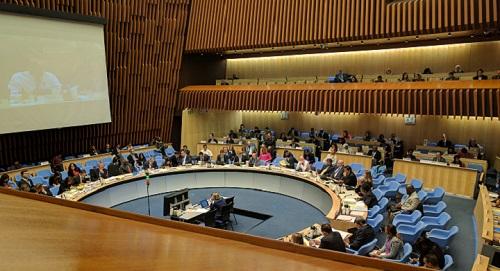Act globally, think locally. It all leads to a WHO resolution….

Sophie Andersson, Executive Director of the International Federation of Psoriasis Associations (IFPA), returns to the World Health Organization’s 140th Executive Board Session this year where in 2014 IFPA got through a historic resolution recognizing psoriasis as a non-communicable disease and October 29th as the World Psoriasis Day. She reflects on this and shares her experiences.
Highlights:
-
All Coalition’s parties are joining their efforts under the common goals of increasing the level of understanding, motivating behaviour change and raising global acceptance of psoriasis as well as promoting psoriasis in the NCD agenda in 2018 and consequently 2020.
-
One of the first activities in the scope of the Coalition is the organization of a side event during the World Health Assembly 2017, where we will showcase the role psoriasis plays in the non-communicable diseases agenda and organize a launching event for the Global Psoriasis Coalition.
The way forward in advancing local health in today’s globalised world is to come at it through global intervention. This would empower the efforts of the many local and national organizations which work in the area of health, and that put their resources, efforts and hearts in the cause of improving people’s living conditions. We live in times when ‘think globally, act locally’ transforms into ‘act globally, think locally’.
At the International Federation of Psoriasis Associations (IFPA), we learnt this lesson very early on. Relying on the work that our member organizations were doing at a national and local level, we initially wanted to lift their efforts and present them to the global arena. Once there, we imagined obtaining global recognition that fits the reality of psoriasis being a painful, severe, chronic non-communicable disease (NCD), affecting 125 million people all around the world. This meant that we had launched IFPA in the mission for a WHO Resolution of Psoriasis.
The road to a WHO Resolution on Psoriasis
The journey to a having a Resolution on Psoriasis started back in 2006, when IFPA determined that there were gaps in the attention that psoriasis was receiving in the agendas on global and national level.
From a global perspective, IFPA concluded that psoriasis had a very low priority on the international agenda and there was no general recognition of the severity of psoriasis. There was also very little information about psoriasis available, as the level of knowledge among the WHO Member States was very low, and almost no resources about psoriasis were available on the WHO website. This made IFPA’s global advocacy aim very concrete: we wanted the WHO to approve a Resolution on Psoriasis.
When looking at the national context, many governments were not prioritising the needs of people with psoriasis, and advocacy work on national level was frequently met with inertia by the decision makers. Connecting it with the global perspective, we concluded that a Resolution on Psoriasis would be a powerful recommendation by the WHO to all WHO Member States to address health issues relating to psoriasis within their country, in line with international evidence base and best practice. It would bring a change effect on many levels, as it would give space for stakeholders from different areas to unite and work together towards a common goal. Last, but not least, it would motivate bigger national actions and enable local and national organizations to advance their work and fulfil their missions of improving the living conditions of people with psoriasis.
With this in mind, IFPA started its proactive work towards the WHO, with the final goal of achieving a Resolution on Psoriasis. The years that followed brought many new achievements: from Panama accepting to be the Resolution’s champion in 2011 and mentioning World Psoriasis Day at the World Health Assembly the next year; to WHO publishing their own paper on psoriasis in 2013; as well as IFPA making statements and holding side events at the 66th and 67th World Health Assembly in 2013 and 2014.
The efforts finally paid off in 2014, when firstly the WHO Executive Board unanimously adopted the proposal for a Resolution on Psoriasis, and then the WHO Resolution on Psoriasis 67.9 was adopted during the 67th World Health Assembly. The latest success story is that during 2016, the WHO published a Global report on Psoriasis, as a direct successor of the Resolution.
The significance of the WHO Resolution and Global Report on Psoriasis
The Resolution is a significant milestone for the global psoriasis community because it:
- recognizes psoriasis as a chronic, non-communicable, painful, disfiguring, and disabling disease, without a cure;
- acknowledges that psoriasis brings not only physical, but also psycho-social and socio-economic consequences;
- establishes a connection between psoriasis and psoriatic arthritis, with a risk of serious co-morbid diseases, such as diabetes and cardiovascular diseases;
- recognizes that psoriasis can lead to immense and needless suffering, due to insufficient access to proper health care.
As a direct follow-up to the Resolution, the Global Report on Psoriasis consists of action points aimed at different stakeholders (patient organizations, decision makers, researchers etc.), offering different solutions and focusing on the public health impact of psoriasis.
Wind of change - next steps for advocacy on psoriasis
Given the announced revision of the NCD Action Plan (2013-2020) in 2018, the next steps for advocacy on psoriasis are inspired by the developments with the global non-communicable diseases agenda. IFPA sees an opportunity to enforce the recognition of psoriasis from the perspective of being a non-communicable disease and the benefits of early screening of people living with psoriasis, that would lead to preventing and reducing the impact of other non-communicable diseases, such as diabetes and cardiovascular diseases.
For this purpose, IFPA has launched the Global Psoriasis Coalition, consisted of non-governmental organizations, patient organizations, medical societies, researchers and corporate partners. All Coalition’s parties are joining their efforts under the common goals of increasing the level of understanding, motivating behaviour change and raising global acceptance of psoriasis as well as promoting psoriasis in the NCD agenda in 2018 and consequently 2020.
One of the first activities in the scope of the Coalition is the organization of a side event during the World Health Assembly 2017, where we will showcase the role psoriasis plays in the non-communicable diseases agenda and organize a launching event for the Global Psoriasis Coalition. We are looking forward to an exciting year of activities and we strive to bring a ‘wind of change’ in the way we look at psoriasis in the non-communicable diseases, through focusing on solutions, aligning stakeholders as well as showcase how investments in psoriasis could benefit health systems as a whole, and potentially help in financing of NCDs.



